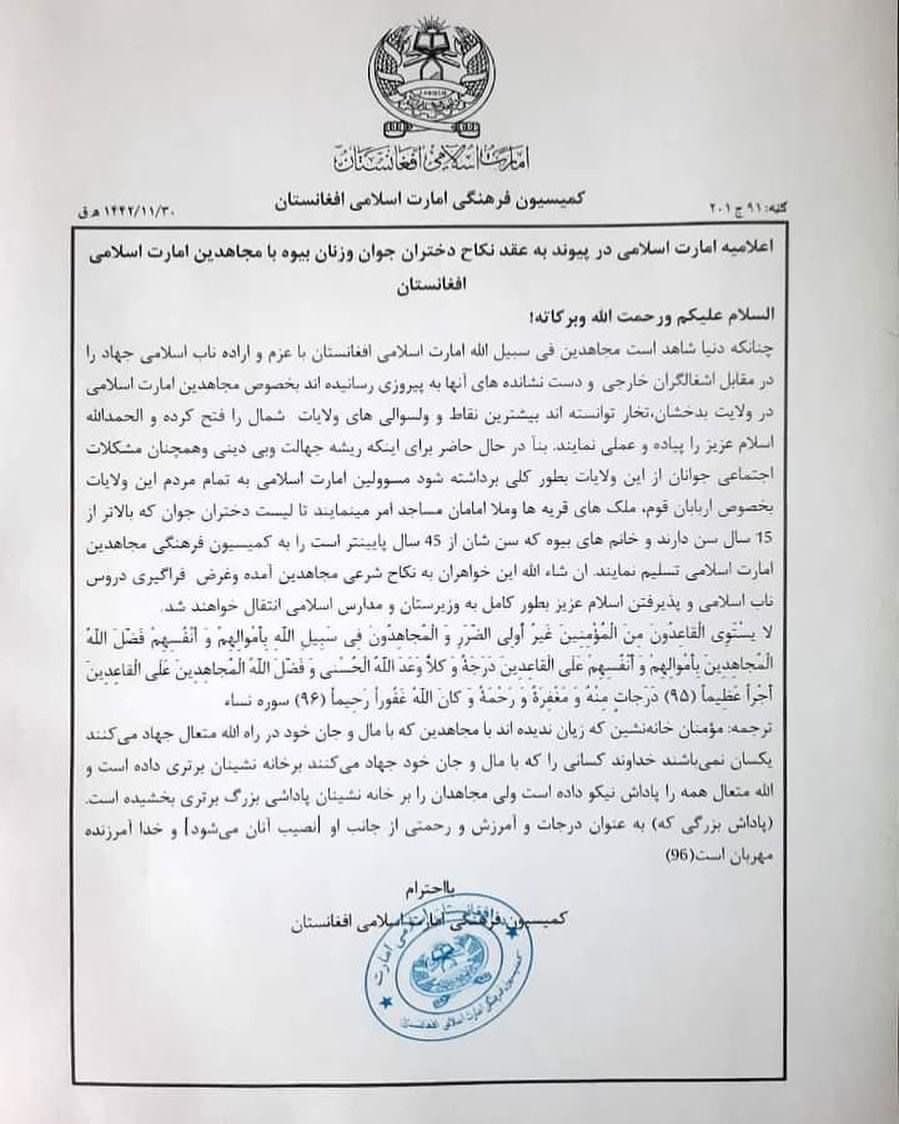“All imams and mullahs in captured areas should provide the Taliban with a list of girls above 14 and widows under 45 to be married to Taliban fighters.”
This is a new diktat issued by the Taliban who have distributed leaflets, ordering locals to follow strict rules that are similar to those they imposed on Afghans when they last governed the country from 1996 to 2001.
Enforcing head to toe covering on women, preventing young girls to go to schools, and now asking for list of names of girls and women between 14-45 group of age – a number of fiats issued by the Taliban which also include that no girl/woman leaves home without any male companion and wearing hijab, no person can wear red and green clothes, everyone should wear a turban and no man can shave. The commandments also include that the girls attending schools beyond sixth grade were barred from classes.
The insurgents warned that anybody violating the rules “will be seriously dealt with”.
A statement purporting to come from the Taliban, circulated on social media, ordered villagers to marry off their daughters and widows to their fighters.
Twitter link :The Taliban poster ordering tribal elders and mullahs to hand over girls over the age of 15 and widows under the age of 45 to the Emirate's cultural commission to marry the group's fighters.
According to this letter of Taliban, they ordered sheiks and Imams of mosques to bring them (above 15) girls & (below 45) widows for marriage
Why did the U.S. withdraw from Afghanistan?
People of Afghanistan need help@EliLake @mdubowitz @MessageFromLen @elliecohanim @BenWeinthal https://t.co/WUSeyyMI3k— Yasaman (@YasamanFlower) July 12, 2021
Top Taliban leaders who signed the peace deal with the US and then joined intra-Afghan peace talks last September, have proclaimed a pragmatic, moderate evolution in their thinking since the late 1990s, when their version of Islamist rule was marked by violence and strict enforcement of bans on girls’ education, women working outside the home, and even men shaving their beards.
But nothing has changed. Instead, residents living in Taliban captured areas have told media that it is the “old” Taliban – every bit as brutal, zealous, and vengeful as they were two decades ago – that are again seizing control, and through their oppressive actions providing a glimpse of the future under their arch conservative sway. There are many posts shared by the locals about the Taliban’s brutal punishments including snatching young girls from their families .
Video : Video whatsApp Talibans snatching young girls fro families
Video Twitter Link :
Taliban beating two women @pagossman @katebanville @_EmmaGH @DastageerMuska @hrw @UN @StuartMcCarthy_ @heatherbarr1 @JacquiLambie #talibancrimes #TalibanOurEnemy #TalibanDestroyingAfghanistan pic.twitter.com/4zNCkQAUC2
— Zadran (@rzadran) July 15, 2021
Video Link 2 : taliban beating a pashtun woman
طالبان د پښتنو ښځې په داسې بې رحمۍ وهي او پښتانه یې سیل ته ناست دي.#WhoAreTaliban #TalibanOurEnemy pic.twitter.com/bSZIsfMzyi
— Matiullah Arman (@MatiullahArman2) June 26, 2021
Before their ouster by the United States in 2001, the Taliban mandated Afghans follow a strict interpretation of Sharia law, forcing women to cover themselves from head to foot and preventing them from leaving their houses without a male companion. Things changed after 2001 when the new Afghan government introduced laws to encourage more girls to attend school and to have more women participate in the workforce and today about 30% of the civil servants are women.
But now, back-to- the -dark ages is also a harsh new reality for the thousands of Afghan women who live in areas recently captured by the Taliban. Residents say those who break the rules are often punished,which include public beatings–another feature of the former rule of the Taliban.
Also read: Afghan army chief comes calling to India amid raging civil war
Listening to music and watching television have also been barred in some areas.
As the United States and its NATO allies withdraw their final troops, ending America’s longest-ever war, fears are growing about what happens to the country thereafter. Many Afghans say they expect that the Taliban will return to power, either via a power-sharing deal with the Afghan government or through use of sheer force.
Last year, many experts were trying hard to argue that the Taliban had changed and reformed, but Afghan women's worst fears were realised with the prospect of the Taliban’s return. Any changes in the Taliban’s views on women’s rights have been tiny, incremental, and often tuned to the conciliatory approach that they adopted in Doh.
As Shaharzad Akbar, Chairperson of Afghanistan Independent Human Rights Commission puts it in her post: “As the violence continues to take lives & livelihoods & Taliban takeover of districts erode rights & freedoms, particularly of women, we Afghans are watching the world’s response, we are following the response of fellow Muslim countries, the governments, the CSOs, the media.”




















